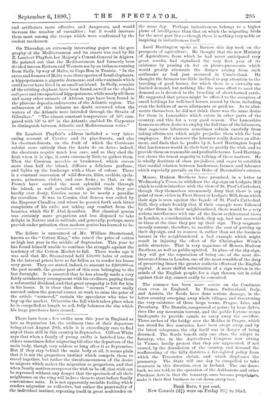Sir Lambert Playfair's address included a very inter- esting account
of Corsica and its pine-forests, and also its chestnut-forests, on the fruit of which the Corsicans subsist more entirely than the Arabs do on dates ; indeed, the chestnuts require much less care, and as they shed the fruit when it is ripe, it costs extremely little to gather them. Then the Corsican macchie or brushwood, which covers more than half the island, diffuses a delicious perfume, and lights up the landscape with a blaze of colour. There is a constant succession of wild-flowers, lilies, orchids, cycla- mens, primroses, violets, and rare ferns ; so that, as the French have carried the most splendid roads through the island, so well metalled with granite that they are hardly ever dusty, Corsica seems to be nearly a paradise for travellers. It was to Corsica that Seneca was exiled by the Emperor Claudius, and where he poured forth such bitter complaints of his exile, not taking any comfort from the beauties which Sir F. Abel describes. But classical genius was certainly more gregarious and less disposed to take delight in Nature and in solitude, and generally, perhaps, more peevish under privation, than modern genius has learned to be.


































 Previous page
Previous page